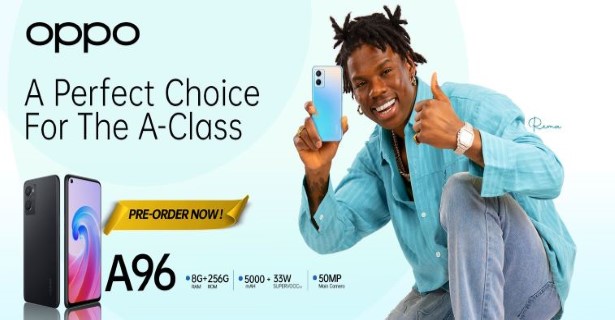Telecom
Reasons to Pre Order the OPPO A96

The latest addition to the OPPO mid-range smart device, A96 which was recently launched at a lavish event in Lagos is now available for pre-order.

No, it is not like your regular phone as it is fabricated with top tier technology that will fascinate and thrill customers. Here’s why you should pre-order;
Anti Peeping Function: With the Anti Peeping function embedded in the OPPO A96, your messages and notifications can stay private to you- as it should be. This function enables the front camera to detect anyone close by and intelligently protects user information by hiding notification content from prying eyes.
Long Lasting Battery: The battery allows users to text on WhatsApp for up to 15 hours while 33W SUPERVOOCTM fast charging ensures that even if your phone was flat, with 30 minutes of charge, you can have up to 55% of battery power.. OPPO A96 also features Optimized Night Charging, which allows the phone’s AI to learn the user’s sleep patterns and schedule a segmented battery charging plan during the nighttime.
Amazing Camera: The device carries a 16MP Front Camera, producing gorgeous portrait shots. With a feature such as the AI Natural Retouching which includes blemish removal while still preserving the user’s natural facial features, portrait shots are now brighter and clearer in dim environments with the help of the 360° Fill Light feature.
The rear-facing dual camera setup features a 50MP Rear Camera with high photosensitivity and high pixel count, and a 2MP Bokeh Camera, allowing users to use Portrait Mode to capture photos with the precise and natural bokeh effects. The rear camera also supports 5x digital zoom and up to 20 continuous burst shots.
Beautiful Design: OPPO A96 has a sleek and aesthetically pleasing design that intentionally has the fingerprint sensor repositioned to the side of the device so as to create a slimmer, more premium look and feel. It comes in two endearing colors, Starry Black and Sunset Blue- shades that effortlessly exude class and luxury.
Form and function work in harmony in the OPPO A96 thanks to the OPPO Glow Design and rigorous testing standards.
Art and technology are often considered entirely separate, but the two intersect in the creation of a phone.
The OPPO A96 uses OPPO Glow Design for a dynamic finish inspired by the entrancing swirling patterns of the cosmos. It twinkles and glints as the phone is turned, evoking the patina of supernova stars millions of light years from our home.
The OPPO A96’s color shifting shell is matched with great everyday IPX4 water and IP5X dust resistance, and excellent general toughness. It is a phone with an appearance to admire, but also one with enduring quality that passes through rigorous quality testing.
Telecom
NCC Orders Telcos Inform Subscribers of Data Breach within 48 Hours

Nigerian Communications Commission (NCC) has directed telecom operators in the country to notify affected customers of any data breach within 48 hours ( that is two day) of detecting such unauthorised infringement.

This directive was contained in the revised Internet Code of Practice 2026 by the NCC, on Friday.
The document seeks to define the rights and obligations of telecom operators in handing the rights of internet users to an open internet.
In the move to protect customer information, Mobile Network Operators (MNOs) and Internet Service Providers (ISPs) are to take necessary measures to protect customers’ data from unauthorised use, disclosure, access or breach.
Telecom operators must now notify affected customers within 48 hours of detecting a compromise through text message, email or any other effective means. As contained in Chapter 3.4 of the regulation titled “Data Breach Notifications,”
The telecoms companies are also directed to notify the NCC of such a breach not later than 48 hours after determining such a breach.
“Where full details of the breach are not immediately available, the provider shall issue a preliminary notification within the same period and furnish a comprehensive update within Fourteen (14) days thereafter, or within such extended period as the Commission may approve,” part of the section reads.
The guidelines, according to NCC, are in tandem with the provisions contained in the Nigerian Data Protection Act 2023 and Part VI of Schedule 1 of the Consumer Code of Practice Regulations 2024.
The regulation also joins other agencies’ policies, ensuring protection. Agencies such as the Nigeria Data Protection Commission (NDPC) and the Federal Competition and Consumer Protection Commission (FCCPC) protect consumers against misuse of personal data, identity theft, financial loss, and reputation damage.
The review comes at a time when privacy becomes core amid frequent breaches and illegal harvest of data such as biometric, national IDs, financial information, traffic and usage, and others.
Regulations are necessary for the proper handling, consent, and regulatory compliance regarding sensitive data, ensuring it is only processed for legitimate purposes.
Under Chapter 3.5, the Internet Code of Practice 2026 addressed the handling of harvesting of transactional data by notifying and getting approval from the NCC of any usage by a third party. It noted that the NCC approval will be defined by a review and assessment of such access and “its potential effects on national considerations, consumer information and personal data.”
Telecom
Globacom Promotes Valentine Gifting with Huge Discounts on Smartphones

Globacom has announced a Valentine Smartphone promotion, which provides incredible savings on a variety of high-end smartphones from top manufacturers including Tecno, Samsung, and Infinix.

Starting on February 9, the promotion provides substantial price reductions on a number of Samsung models, including the Galaxy Z Fold 7, Galaxy A07, Galaxy A56 5G, Galaxy A36 5G, and Galaxy A26 5G. Customers who buy any of the phones will also receive a complimentary travel pouch and charger, as well as up to 18GB of extra data for six months, only available on the Glo network.
Along with other Infinix models, Tecno devices are also offered at attractive discounts, giving customers a large range of smartphones to fit a variety of tastes and price ranges.
The goal of the Glo Valentine promotion is to provide customers with the best possible deals on carefully chosen smartphones that are renowned for their cutting-edge technology, stylish designs, and dependable performance. The offer, which includes alternatives to suit a range of budgets and lifestyles, reaffirms Globacom’s dedication to customer happiness, digital adoption, greater data usage, and client centricity.
The company revealed that the promotion aligned with customers’ expectations during celebratory seasons, when demand is highest for quality smartphones at affordable prices. The company added that its partnership with trusted global and regional brands such as Samsung, Infinix, and Tecno ensures that customers enjoy premium features without compromising on value.
“The Valentine season is about connection, and what better way to stay connected than with a smartphone that fits your needs and aspirations,” the company stated. “This promo gives our customers the chance to get their dream smartphones at some of the best prices of the year, along with generous data bonuses to keep them connected,” the company disclosed.
Customers are encouraged to visit Gloworld outlets nationwide to take advantage of the Valentine Smartphone Promo while stocks last.
Telecom
GBB Expands Broadband to 13 Underserved Communities In 2025

Galaxy Backbone Limited (GBB) has recorded a significant milestone in Nigeria’s digital transformation journey by advancing broadband connectivity to 13 underserved institutions and communities nationwide in 2025, reinforcing its position as the nation’s digital backbone and a trusted partner in national development.

Guided by its mandate to enable a digitally inclusive Nigeria, GBB deliberately extended connectivity to locations within reach of its infrastructure footprint, particularly institutions with strong potential for productive use but limited readiness for immediate commercial engagement. Through this effort, the organisation continues to unlock opportunity, stimulate innovation, and support sustainable growth across critical sectors of the economy.
The expansion reached three Federal Universities, two Local Government Areas, and eight Federal Secretariats, strengthening digital capabilities in education and public administration while enhancing service delivery across the country.
GBB also extended reliable broadband connectivity to strategic and cultural landmarks such as the Nnamdi Azikiwe International Airport, Abuja, underscoring its commitment to supporting national infrastructure that drives economic activity, mobility, and global connectivity.
These deployments highlight Galaxy Backbone’s resolve to bridge the digital divide and empower institutions that shape Nigeria’s future. They demonstrate the measurable national impact of GBB’s infrastructure investments and reflect the tangible progress of the Integrated Digital Transformation Strategy (IDTS), further solidifying the organisation’s role as the platform upon which government institutions and communities can confidently build their digital future.
More importantly, the milestone illustrates that GBB’s work extends beyond technology by enabling education, improving governance, supporting economic participation, and connecting citizens to opportunity.
The initiative aligns with the Federal Government’s broadband penetration objectives and complements national programmes such as Project 774 – Universities’ Hostel Connectivity, ensuring coordinated, scalable, and sustainable impact across the country. Commenting on the achievement, Galaxy Backbone noted that every new connection brings Nigeria closer to a more inclusive digital economy while reinforcing the infrastructure required for innovation and national competitiveness.
As implementation continues, GBB remains committed to expanding access, pushing boundaries, and delivering on the promise of a fully digital nation, with further updates expected as additional phases of the deployment progress.
Galaxy Backbone Limited is the Federal Government’s digital infrastructure and shared services provider, dedicated to delivering secure, reliable, and scalable ICT solutions that support efficient governance, innovation, and sustainable national development.

 E-Financial3 days ago
E-Financial3 days agoNAICOM Targets Resilient, Global Competition Market in Insurance Sector Consolidation

 News3 days ago
News3 days agoNITDA Explores Partnership with Trust Stamp on Digital Trust and Innovation

 Telecom3 days ago
Telecom3 days agoNCC Orders Telcos Inform Subscribers of Data Breach within 48 Hours

 E-Financial3 days ago
E-Financial3 days agoIGP Designates Banks National Security Asset, Orders Crackdown on Cyber Frauds

 General News3 days ago
General News3 days agoCybersecurity Firm Warns Against Gift Card Scams @ Saint Valentine’s Day

 E-Financial3 days ago
E-Financial3 days agoRashidat Adebisi Unveils Strategic Roadmap for Nigeria’s Insurance Sector under NIIRA 2025

 Telecom3 days ago
Telecom3 days agoGlobacom Promotes Valentine Gifting with Huge Discounts on Smartphones

 Telecom3 days ago
Telecom3 days agoMTN Backs Bosun Tijani’s Vision for Africa’s AI Leadership


























